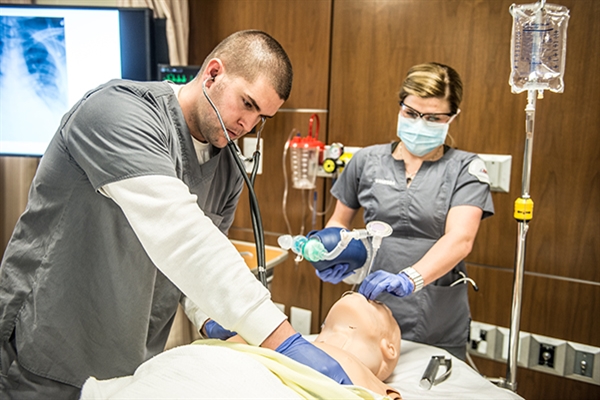News & Blog
DIPLOMA IN RESPIRATORY THERAPY TECHNICIAN COURSE
Respiratory therapy focuses on evaluating, treating, and monitoring patients with respiratory conditions. These conditions range from asthma, chronic obstructive pulmonary disease (COPD), and pneumonia to more critical cases such as acute respiratory distress syndrome (ARDS) and respiratory failure. Respiratory therapists work closely with patients and physicians to develop individualized treatment plans and provide critical care during emergency situations.
The Role of a Respiratory Therapy Technician: A diploma in Respiratory Therapy Technician equips individuals with the necessary skills to assist respiratory therapists in various clinical settings. These technicians are an essential part of the respiratory care team and contribute to the overall patient care process. Some of the key responsibilities of a respiratory therapy technician include:
-
Patient Assessment: Under the guidance of respiratory therapists, technicians help in evaluating patients' respiratory conditions by collecting vital signs, conducting diagnostic tests, and assessing lung function.
-
Equipment Setup and Maintenance: They assist in preparing and maintaining respiratory care equipment such as oxygen therapy devices, mechanical ventilators, and aerosol therapy devices. Technicians ensure the equipment is functioning properly and troubleshoot any issues that may arise.
-
Treatment Administration: Respiratory therapy technicians help deliver prescribed respiratory treatments, including oxygen therapy, bronchodilator administration, and chest physiotherapy. They ensure patients receive the appropriate therapy and monitor their responses.
-
Patient Education and Support: Technicians play a crucial role in educating patients about their respiratory conditions, self-care techniques, and proper equipment usage. They offer emotional support and guidance to patients and their families, helping them understand and cope with their respiratory challenges.
-
Data Collection and Documentation: Accurate record-keeping is essential in healthcare. Respiratory therapy technicians document patient information, treatment plans, and progress notes to maintain a comprehensive medical record.
Career Opportunities: After completing a diploma in Respiratory Therapy Technician, graduates have several career opportunities to explore. They can work in hospitals, clinics, rehabilitation centers, home healthcare settings, and even in research and education. With experience and further education, individuals can advance to roles such as respiratory therapist, clinical specialist, or department manager.
WHY PURSUE A DIPLOMA IN RESPIRATORY THERAPY TECHNICIAN?
-
Job Stability: The demand for respiratory therapy technicians is expected to grow due to the increasing prevalence of respiratory diseases. This diploma provides a pathway to a stable and fulfilling career in the healthcare industry.
-
Hands-on Learning: The diploma program offers practical training that allows students to develop technical skills through hands-on experience with respiratory equipment and patient care scenarios. This practical approach ensures graduates are ready to apply their knowledge in real-world settings.
-
Impactful Work: As a respiratory therapy technician, individuals have the opportunity to make a meaningful impact on patients' lives. They play a crucial role in improving respiratory health, providing care during emergencies, and enhancing the overall quality of life for individuals with respiratory conditions.
-
Collaboration and Teamwork: Respiratory therapy is a collaborative field, and technicians work closely with a diverse healthcare team. This profession fosters teamwork, communication, and the ability to work effectively in a fast-paced and high-pressure environment.
-
Career Advancement: With experience and further education, respiratory therapy technicians can pursue higher-level roles, specialize in areas such as critical care or sleep medicine, or transition to other healthcare fields such as education or research
BUSINESS OUTLOOK AND SALARY INFORMATION
Respiratory specialists earned a yearly middle pay of $57,790 in 2015, as per the U.S. Agency of Labor Statistics (BLS), and could expect 12% occupation development during the 2014-multi decade. The BLS exhorts that those with four year certifications or affirmation ought to have the best chances. Then again, respiratory treatment professionals earned a yearly middle pay of $48,490 in 2015. From 2014-2024, the BLS anticipated a normal employment decay of 19% for these experts.
DIPLOMA IN RESPIRATORY THERAPY TECHNICIAN COURSE: COURSE HIGHLIGHTS
Given below are few of the important highlights of the program.
|
Program Full Name |
DIPLOMA IN RESPIRATORY THERAPY TECHNICIAN COURSE |
|
Program Level |
Diploma |
|
Duration of the Program |
2 Years |
|
Examination Type |
Year |
|
Eligibility |
12th |
|
Admission Process |
Entrance Exam and Merit Based |
|
Average Program Fee |
Upto Rs. 1 Lakh |
_________________________________________________________________________________________
For more information
National Institute of Health Science & Research
Ph 0161-5013232
Mobile 09217603232, 9316850388, 9216150388, 9216750388
24/7 Helpline No 78726-78726











